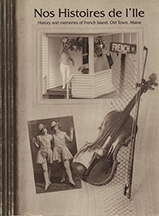Document Type
Oral History
Interviewer
Albert Michaud
Interview date
10-6-1993
Interview location
Old Town, Maine
Time
00:12:05
Files
Download Full Text (1.3 MB)
Streaming Media
Abstract
Clayton Landry, interviewed by Albert Michaud, October 6, 1993, at his home in Old Town, Maine. For the "Islands and Bridges" project. Landry discusses moving to French Island; boxing matches; neighbors; the Shuffle Inn; grocery stores; cutting ice from the Penobscot River; entertainment and children's games; changing French names to English; St. Joseph's school; children's economic activities; community garbage disposal; pulpwood river drives; heating (or not) with wood stoves; holidays; Catholic Order of Foresters; Ku Klux Klan; and his service in WWII.
Listen
Part 1. mfc_na2769_c1497_01
Part 2. mfc_na2769_c1497_02
Disciplines
Oral History | United States History
Birth date
December 24, 1924
Location
Ellsworth, Hancock County, Maine
Death date
October 11, 2014
Location
Bangor, Penobscot County, Maine
Nation of origin
United States
Home state/Territory
Maine
Gender
Male
Ethnicity
European-American
Ethnic group
Franco-American
Occupation
Cobbler (Shoemaker)
Branch of service
U.S. Army
Service Unit
87th Infantry Division
Dates of service
1943-1945
Date of entry
April 9, 1943
Service entry
Enlisted
Location of Service
European Theatre
Wars & Conflicts
World War II
Entry Rank
E-1 Private
Names
Maurice Duplessa; Henry Lavasseur
Locations
France; Germany
Headings
Maine History; Old Town Maine History; Franco-Americans History; Franco-américains Histoire
Collection name
Islands and Bridges: Communities of Memory in Old Town, Maine / French Island Collection
Collection number
MF026
Item number
NA2769
Recommended Citation
Landry, Clayton, "Clayton Landry, interviewed by Albert Michaud, Part 2" (2023). MF026 Islands and Bridges: Communities of Memory in Old Town, Maine. 32.
https://digitalcommons.library.umaine.edu/mf026/32
Rights and Access Note
This Item is protected by copyright and/or related rights. You are free to use this Item in any way that is permitted by the copyright and related rights legislation that applies to your use. In addition, no permission is required from the rights-holder(s) for non-commercial uses. For other uses, you need to obtain permission from the rights-holder(s). For more information, contact Special Collections.




